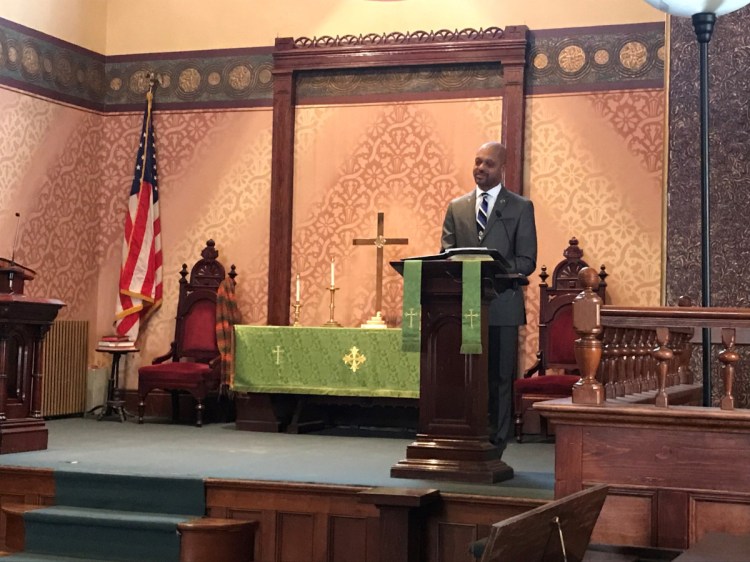FARMINGTON — Rep. Craig Hickman, D-Winthrop, on Monday urged a small group honoring Dr. Martin Luther King Jr. to remember that while our nation has come a long way since King’s famed “I Have A Dream” speech in 1963, we still have a long ways to go.
“The arc of my life corresponds almost exactly to the span of time since Dr. King handed us the baton in the struggle for beauty, love, peace and justice, and so it seems serendipitous that I would be standing before you today delivering these remarks,” Hickman said. “And even as I stand here, living proof that we have come a long way, let us never deny nor disremember the events that show us we still have a long way to go.”
Hickman, who is the first openly gay African-American to serve in the Maine House of Representatives, spoke to a crowd of about 50 people Monday at the Old South First Congregational Church, where he was invited by the Farmington Area Ecumenical Ministry.
In a roughly 30-minute speech, Hickman talked about one of his own experiences of discrimination, being singled out by a security officer in the Boston area, and also read from his memoir about being adopted, “Fumbling Toward Divinity: The Adoption Scriptures.”
In 1993, 30 years after King’s speech at the March on Washington for Jobs and Freedom, Hickman was walking into the Worcester Art Museum carrying a black tote bag when he was stopped by a security officer who questioned what the bag was for.
Hickman told the officer to back off — that his bag was just like those being carried in by other museum-goers — but he couldn’t help feeling he had been singled out as potentially trying to steal art, deal drugs or vandalize the museum.
He walked past the man but couldn’t help but feel the weight of the bag a little bit more.
“1963 is not an end, but a beginning,” Hickman said in reading from King’s speech immediately after telling his own tale of encountering discrimination. “And those who hope that the Negro needed to blow off steam and will now be content will have a rude awakening if the nation returns to business as usual.”
Later, Hickman also talked about the experience of his adopted father, Hazelle Hickman, who moved from Memphis, Tennessee, to Milwaukee, Wisconsin, in 1946 to find work, a move that was not uncommon among African-Americans in the south at the time.
Hickman was born in Madison, Wisconsin, in December 1967, just four weeks after King’s “But if Not” speech in Atlanta, and he was adopted in April 1969, one year after King’s assassination.
Today, he said, blacks are still incarcerated at rates disproportionate to whites, “prolonging a new slavery of mass incarceration with no presidential emancipation proclamation on the way.”
Racial profiling, lynching, poverty and voter suppression still exist.
In closing Hickman reminded the group that the time for action is now and one of the most impactful things that can be done is to vote.
“We are at a crossroads,” Hickman said. “The soul of this nation is sick. There is no time for silence. There is no time for despair. The election outcome was good, but we must still organize. We must still show up. We must keep the faith. We must have hope, and above all things, we must always vote.”
Rachel Ohm — 612-2368
Twitter: @rachel_ohm
Send questions/comments to the editors.



